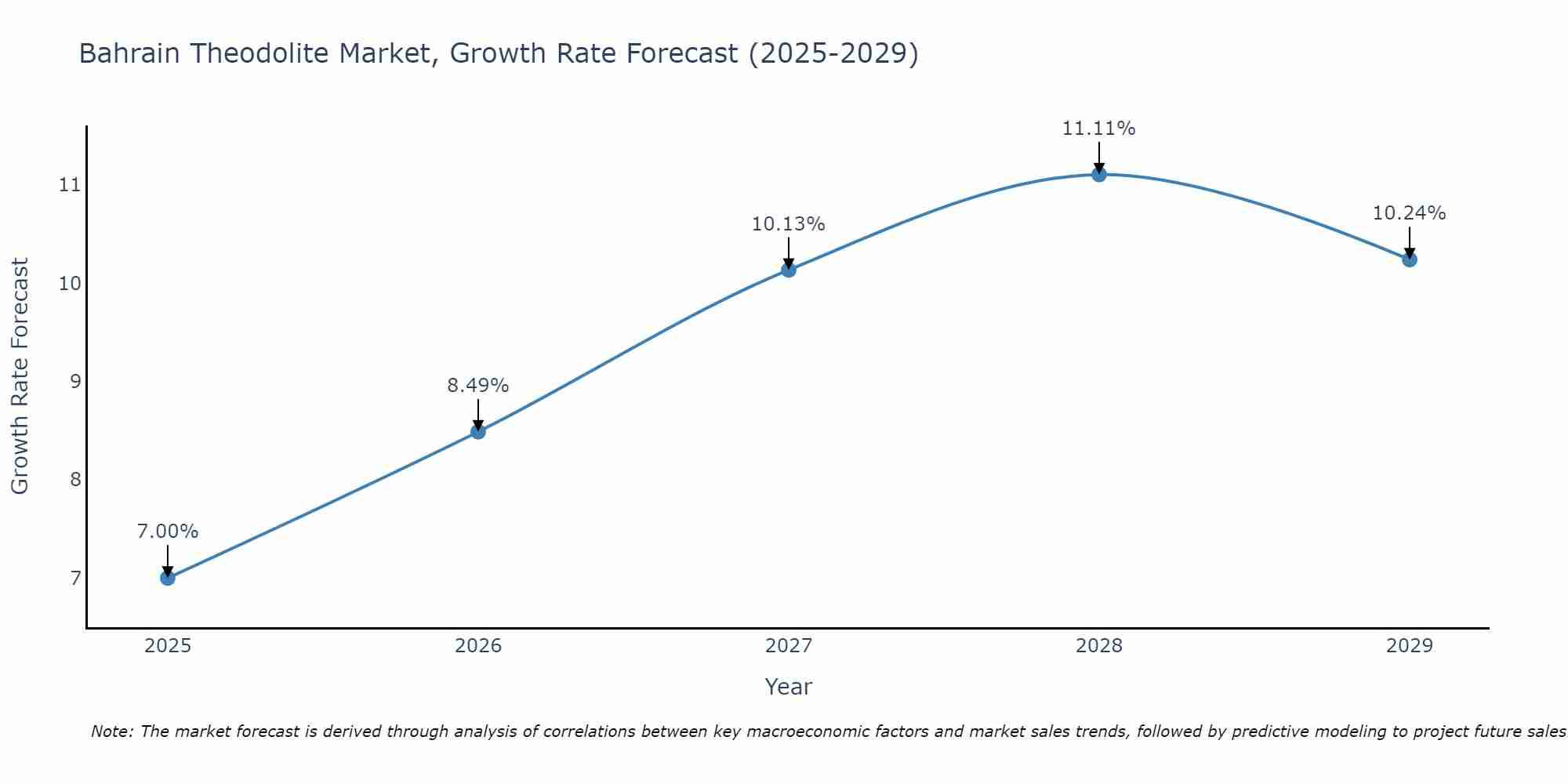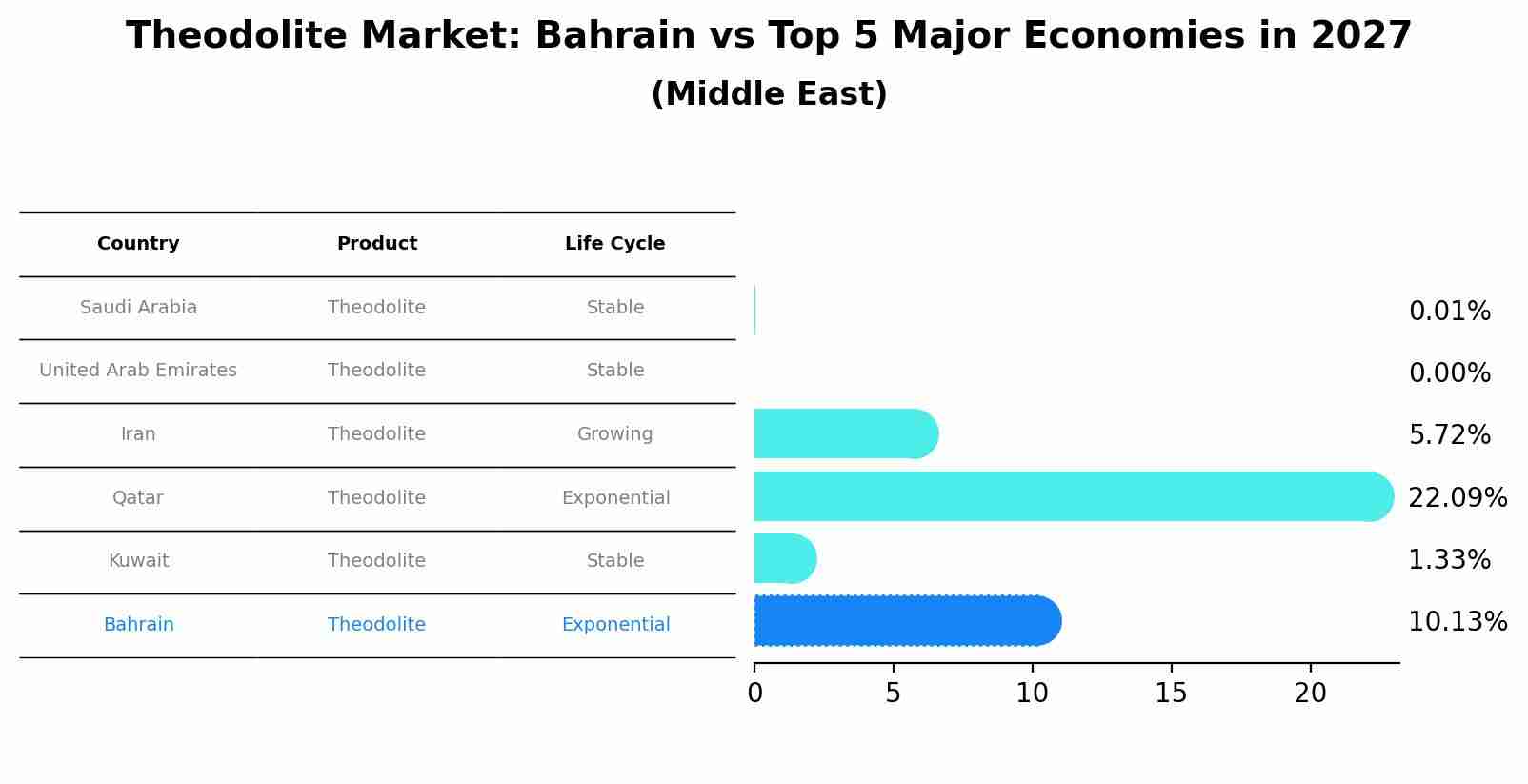Bahrain Theodolite Market (2025-2031) Outlook | Revenue, Share, Trends, Industry, Analysis, Forecast, Size, Growth, Companies & Value
| Product Code: ETC432640 | Publication Date: Oct 2022 | Updated Date: Apr 2025 | Product Type: Market Research Report | |
| Publisher: 6Wresearch | Author: Sachin Kumar Rai | No. of Pages: 75 | No. of Figures: 35 | No. of Tables: 20 |
Bahrain Theodolite Market Size Growth Rate
The Bahrain Theodolite Market is projected to witness mixed growth rate patterns during 2025 to 2029. Starting at 7.00% in 2025, the market peaks at 11.11% in 2028, and settles at 10.24% by 2029.

Theodolite Market: Bahrain vs Top 5 Major Economies in 2027 (Middle East)
By 2027, the Theodolite market in Bahrain is anticipated to reach a growth rate of 10.13%, as part of an increasingly competitive Middle East region, where Saudi Arabia remains at the forefront, supported by United Arab Emirates, Iran, Qatar and Kuwait, driving innovations and market adoption across sectors.

Bahrain Theodolite Market Synopsis
The theodolite market in Bahrain supports surveying, construction, and civil engineering sectors. These precision instruments are used to measure angles and elevations, vital for accurate land assessment. The increasing complexity of construction projects has kept demand steady for both digital and manual theodolite devices.
Trends of the market
The theodolite market in Bahrain supports construction, engineering, and land surveying activities with a focus on precision and durability. Demand is closely tied to infrastructure and civil projects, including highways, residential zones, and utility mapping. Digital theodolites have largely replaced optical ones due to their ease of use and data integration capabilities. Equipment is primarily imported from manufacturers in Japan, Germany, and China. The rental market for theodolites is also robust, given the project-based nature of demand. Training on usage and regular calibration services are crucial for operational accuracy in this segment.
Challenges of the market
The theodolite market in Bahrain faces difficulties due to limited construction and geodetic activity outside government-led infrastructure. The market heavily depends on imports, increasing cost and reducing accessibility for small firms. A lack of training facilities for surveyors means the instruments are underutilized or misapplied. Moreover, competition from total stations and GPS-based systems reduces the demand for traditional theodolites. Market players struggle to maintain after-sales support and calibration services.
Investment opportunities in the Market
The Theodolite market in Bahrain is driven by growth in construction, transportation infrastructure, and civil engineering activities. As demand for high-accuracy angle and distance measurement tools grows, digital and laser theodolites are becoming standard in modern project sites. Investors can capitalize on this need by offering rugged, GPS-integrated, and cost-effective solutions tailored to the local environment. Establishing after-sales services and calibration centers will enhance market trust and retention. Import substitution through local assembly or distribution partnerships can also generate strong returns and reduce dependency on external markets.
Government Policy of the market
The theodolite market in Bahrain is governed by industrial standards for accuracy and calibration, especially in the construction and infrastructure sectors. The government mandates the use of certified measuring instruments for surveying in large-scale infrastructure projects, such as bridges, roads, and buildings. The Ministry of Works and SLRB oversee equipment regulations and training programs to ensure that users are proficient and devices meet technical requirements. Import duties on precision engineering equipment may be waived for government projects or certified construction firms. Bahrain also supports the digitization of surveying tools through smart construction initiatives. These efforts contribute to reliable project execution, accurate land measurements, and compliance with international engineering standards.
Key Highlights of the Report:
- Bahrain Theodolite Market Outlook
- Market Size of Bahrain Theodolite Market, 2024
- Forecast of Bahrain Theodolite Market, 2031
- Historical Data and Forecast of Bahrain Theodolite Revenues & Volume for the Period 2021 - 2031
- Bahrain Theodolite Market Trend Evolution
- Bahrain Theodolite Market Drivers and Challenges
- Bahrain Theodolite Price Trends
- Bahrain Theodolite Porter's Five Forces
- Bahrain Theodolite Industry Life Cycle
- Historical Data and Forecast of Bahrain Theodolite Market Revenues & Volume By Product Type for the Period 2021 - 2031
- Historical Data and Forecast of Bahrain Theodolite Market Revenues & Volume By Vernier Theodolite for the Period 2021 - 2031
- Historical Data and Forecast of Bahrain Theodolite Market Revenues & Volume By Optical Theodolite for the Period 2021 - 2031
- Historical Data and Forecast of Bahrain Theodolite Market Revenues & Volume By Electronic Theodolite for the Period 2021 - 2031
- Historical Data and Forecast of Bahrain Theodolite Market Revenues & Volume By Application for the Period 2021 - 2031
- Historical Data and Forecast of Bahrain Theodolite Market Revenues & Volume By Theodolite for Construction for the Period 2021 - 2031
- Historical Data and Forecast of Bahrain Theodolite Market Revenues & Volume By Theodolite for Oil & Gas for the Period 2021 - 2031
- Historical Data and Forecast of Bahrain Theodolite Market Revenues & Volume By Theodolite for Mining for the Period 2021 - 2031
- Historical Data and Forecast of Bahrain Theodolite Market Revenues & Volume By Theodolite for Agriculture for the Period 2021 - 2031
- Historical Data and Forecast of Bahrain Theodolite Market Revenues & Volume By Others for the Period 2021 - 2031
- Bahrain Theodolite Import Export Trade Statistics
- Market Opportunity Assessment By Product Type
- Market Opportunity Assessment By Application
- Bahrain Theodolite Top Companies Market Share
- Bahrain Theodolite Competitive Benchmarking By Technical and Operational Parameters
- Bahrain Theodolite Company Profiles
- Bahrain Theodolite Key Strategic Recommendations
Frequently Asked Questions About the Market Study (FAQs):
Export potential assessment - trade Analytics for 2030
Export potential enables firms to identify high-growth global markets with greater confidence by combining advanced trade intelligence with a structured quantitative methodology. The framework analyzes emerging demand trends and country-level import patterns while integrating macroeconomic and trade datasets such as GDP and population forecasts, bilateral import–export flows, tariff structures, elasticity differentials between developed and developing economies, geographic distance, and import demand projections. Using weighted trade values from 2020–2024 as the base period to project country-to-country export potential for 2030, these inputs are operationalized through calculated drivers such as gravity model parameters, tariff impact factors, and projected GDP per-capita growth. Through an analysis of hidden potentials, demand hotspots, and market conditions that are most favorable to success, this method enables firms to focus on target countries, maximize returns, and global expansion with data, backed by accuracy.
By factoring in the projected importer demand gap that is currently unmet and could be potential opportunity, it identifies the potential for the Exporter (Country) among 190 countries, against the general trade analysis, which identifies the biggest importer or exporter.
To discover high-growth global markets and optimize your business strategy:
Click Here- Single User License$ 1,995
- Department License$ 2,400
- Site License$ 3,120
- Global License$ 3,795
Search
Thought Leadership and Analyst Meet
Our Clients
Related Reports
- Saudi Arabia Car Window Tinting Film, Paint Protection Film (PPF), and Ceramic Coating Market (2025-2031) | Strategy, Consumer Insights, Analysis, Investment Trends, Opportunities, Growth, Size, Share, Industry, Revenue, Segments, Value, Segmentation, Supply, Forecast, Restraints, Outlook, Competition, Drivers, Trends, Demand, Pricing Analysis, Competitive, Strategic Insights, Companies, Challenges
- South Africa Stationery Market (2025-2031) | Share, Size, Industry, Value, Growth, Revenue, Analysis, Trends, Segmentation & Outlook
- Afghanistan Rocking Chairs And Adirondack Chairs Market (2026-2032) | Size & Revenue, Competitive Landscape, Share, Segmentation, Industry, Value, Outlook, Analysis, Trends, Growth, Forecast, Companies
- Afghanistan Apparel Market (2026-2032) | Growth, Outlook, Industry, Segmentation, Forecast, Size, Companies, Trends, Value, Share, Analysis & Revenue
- Canada Oil and Gas Market (2026-2032) | Share, Segmentation, Value, Industry, Trends, Forecast, Analysis, Size & Revenue, Growth, Competitive Landscape, Outlook, Companies
- Germany Breakfast Food Market (2026-2032) | Industry, Share, Growth, Size, Companies, Value, Analysis, Revenue, Trends, Forecast & Outlook
- Australia Briquette Market (2025-2031) | Growth, Size, Revenue, Forecast, Analysis, Trends, Value, Share, Industry & Companies
- Vietnam System Integrator Market (2025-2031) | Size, Companies, Analysis, Industry, Value, Forecast, Growth, Trends, Revenue & Share
- ASEAN and Thailand Brain Health Supplements Market (2025-2031) | Strategy, Consumer Insights, Analysis, Investment Trends, Opportunities, Growth, Size, Share, Industry, Revenue, Segments, Value, Segmentation, Supply, Forecast, Restraints, Outlook, Competition, Drivers, Trends, Demand, Pricing Analysis, Competitive, Strategic Insights, Companies, Challenges
- ASEAN Bearings Market (2025-2031) | Strategy, Consumer Insights, Analysis, Investment Trends, Opportunities, Growth, Size, Share, Industry, Revenue, Segments, Value, Segmentation, Supply, Forecast, Restraints, Outlook, Competition, Drivers, Trends, Demand, Pricing Analysis, Competitive, Strategic Insights, Companies, Challenges
Industry Events and Analyst Meet
Whitepaper
- Middle East & Africa Commercial Security Market Click here to view more.
- Middle East & Africa Fire Safety Systems & Equipment Market Click here to view more.
- GCC Drone Market Click here to view more.
- Middle East Lighting Fixture Market Click here to view more.
- GCC Physical & Perimeter Security Market Click here to view more.
6WResearch In News
- Doha a strategic location for EV manufacturing hub: IPA Qatar
- Demand for luxury TVs surging in the GCC, says Samsung
- Empowering Growth: The Thriving Journey of Bangladesh’s Cable Industry
- Demand for luxury TVs surging in the GCC, says Samsung
- Video call with a traditional healer? Once unthinkable, it’s now common in South Africa
- Intelligent Buildings To Smooth GCC’s Path To Net Zero


















